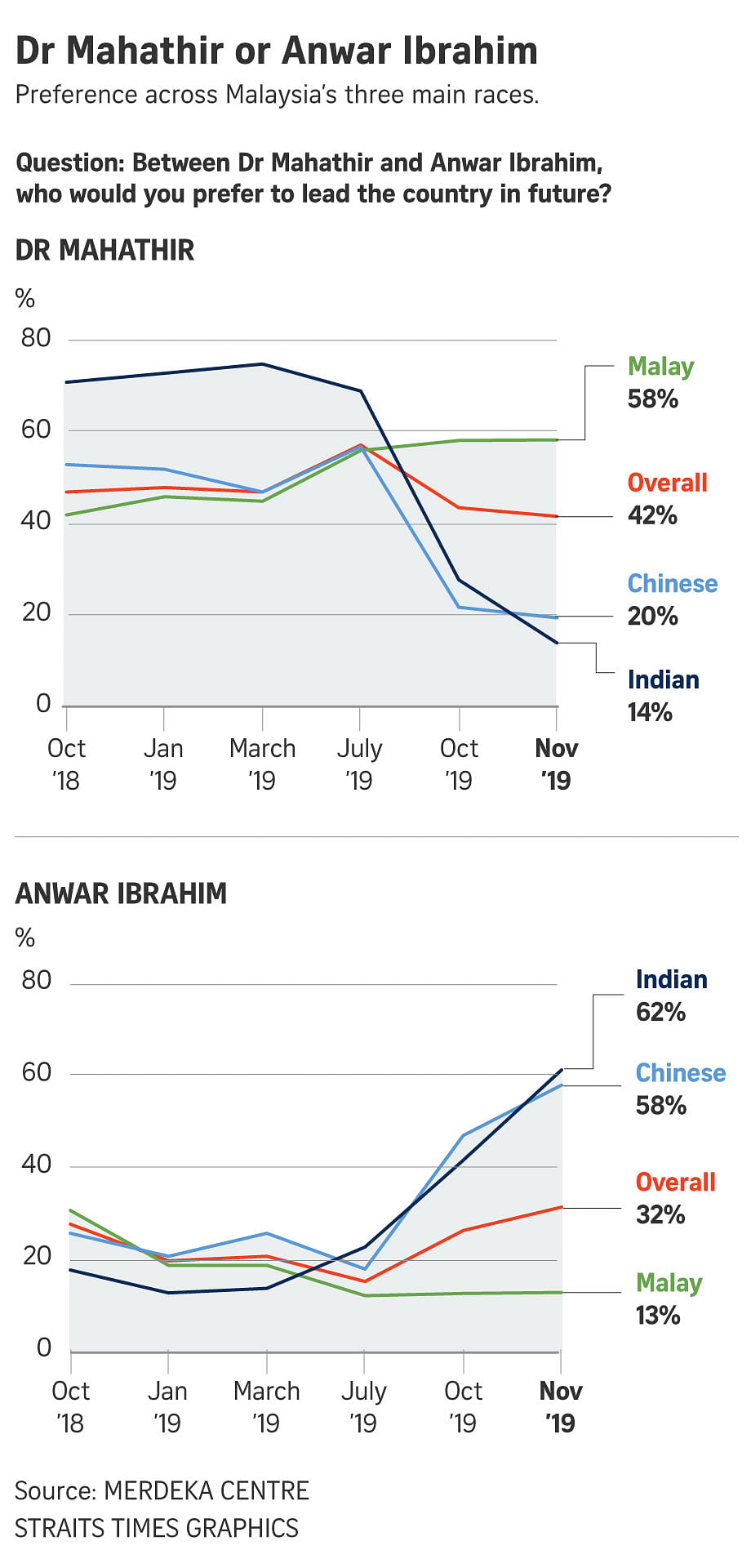KUALA LUMPUR - Opinion polls show Malaysians, and crucially, most of the Malay-Muslim majority, prefer Prime Minister Mahathir Mohamad to lead the country instead of Datuk Seri Anwar Ibrahim, reflecting the political ramifications for Pakatan Harapan (PH) as the clock ticks on the transition pledge agreed before the coalition's unexpected 2018 election win.
Some 42 per cent of Malaysians surveyed by the country's top pollster Merdeka Centre in November picked the 94-year-old Tun Dr Mahathir, compared to less than a third who selected Mr Anwar, who is president of the coalition component party Parti Keadilan Rakyat (PKR).
Among Malays, who are the majority in 122 out of 222 parliamentary wards, the gap widens to 58 per cent against 13 per cent.
However, the increasing dissatisfaction among Chinese and Indians over perceived pro-Malay policies since Malaysia's unprecedented change of government in May 2018 saw 58 per cent and 62 per cent of the two minority groups wanting an Anwar administration, versus 20 per cent and 14 per cent for Dr Mahathir.
In the report seen by The Straits Times, Merdeka Centre said there is "increased uncertainties over nature, timing and outcome of the transfer of premiership" and pointed to "internal dynamics and friction between the two leaders" leading to "increased speculation and suspicion".
A positive note for Mr Anwar is that his overall backing has improved from 28 per cent last year and a low of 16 per cent in July, while Parti Pribumi Bersatu Malaysia (PPBM) chief Mahathir's support has ebbed from 47 per cent last year and a high of 57 per cent in July.
But despite low support for Mr Anwar and a preference for Dr Mahathir, Malaysians appear more inclined towards PH carrying out its transition pledge. Half of Malaysians want the handover to happen versus 41 per cent who say there should be no change until the next election due in 2023.
A quarter of those polled want Dr Mahathir to relinquish the premiership immediately, and the same proportion say he should do so by May 2020 - the two-year mark which Mr Anwar, who had to be pardoned from a controversial sodomy conviction after the May 2018 election, and his allies have set as their expected timeline.
However, Dr Mahathir has firmly said he wants to lead Malaysia in hosting the Apec Summit this year, therefore ruling out an exit before November.
ST reported in November last year that PH is split over the transition, including even leaders within Mr Anwar's own PKR, leaving him short of the 112 MPs needed to secure control of Parliament.
This has opened the door to possible realignments, especially to co-opt lawmakers from the two Malay-Muslim giants in opposition - Umno and Parti Islam SeMalaysia (PAS) - to shore up support from the community that has overwhelmingly backed the opposition in by-elections over the past year.
Some 52 per cent of Malays want Dr Mahathir to extend his second stint in charge to the end of the term and so do 62 per cent of Muslims from indigenous tribes. However, only 19 per cent and 22 per cent of Chinese and Indians respectively want to see him continue to lead.
The ruling PH is already suffering ebbing support across all races since its shock victory that gave Malaysia its first ever change of government.
A string of by-election defeats last year was capped off with the worst-ever performance by a ruling party in the Tanjung Piai vote on Nov 16, where PH took only a quarter of the ballots.
The galvanising of Umno and PAS into a formal opposition pact is also applying increasing pressure on the government, as fears are being stoked among Malays of losing state-sanctioned privileges.
But PH's concessions to Malays have led to backlash from minorities, particularly over the introduction of Arabic calligraphy in schools and the failure to deport fugitive Indian-born Muslim preacher Zakir Naik after he questioned the loyalty of non-Malays.
While the Merdeka Centre report did not include approval ratings for PH, it did show that only 26 per cent of Malaysians felt Malaysia was headed in the right direction.
The "right direction" metric has been a good proxy for government approval in the past, with the June level at 40 per cent while PH popularity was at 41 per cent.



